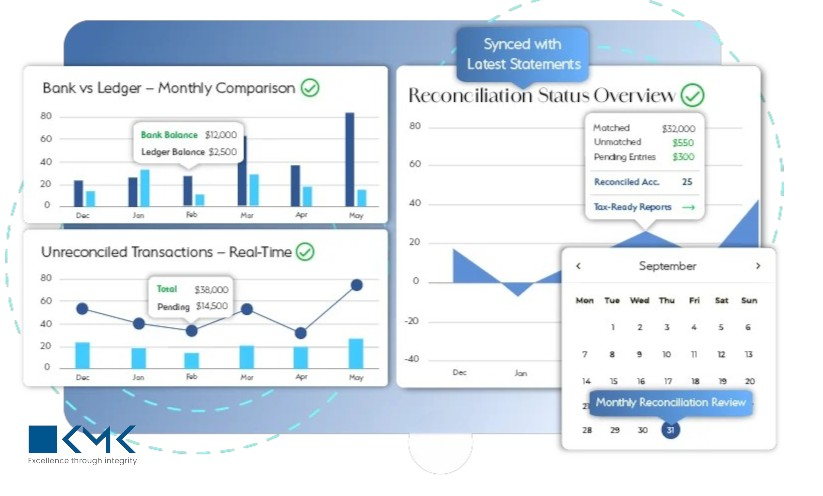How to Outsource Bank Reconciliation Services for US Businesses

Managing financial accuracy is one of the biggest priorities for any business, whether it’s a startup, mid-sized company, or a large enterprise. Among the many finance functions that demand precision, bank reconciliation stands out. This process ensures that a company’s financial records align with its bank statements, detecting discrepancies before they snowball into larger issues. However, as businesses grow, manual reconciliation becomes increasingly time-consuming and resource-intensive. That’s where bank reconciliation outsourcing services come into play. In this article, we’ll walk through why outsourcing makes sense, how US businesses can approach the process, and what factors to consider to ensure success.
Why Is Bank Reconciliation Important for Businesses?
Bank reconciliation is more than just checking balances. It helps businesses:
-
Detect fraud or unauthorized transactions quickly.
-
Identify accounting errors and omissions.
-
Maintain accurate cash flow records.
-
Meet compliance and audit requirements.
Without regular reconciliation, businesses run the risk of financial mismanagement, leading to poor decision-making. But the process can be tedious, especially when dealing with multiple accounts, large transaction volumes, or international operations.
Why Consider Bank Reconciliation Outsourcing Services?
So, why should a US business outsource this critical finance function? Here are some practical benefits:
-
Cost Efficiency – Outsourcing eliminates the need to hire and train in-house staff for repetitive reconciliation tasks.
-
Access to Expertise – Professional service providers specialize in reconciliation and use the latest tools and technologies.
-
Time Savings – Freeing up your internal team from data-heavy processes allows them to focus on strategy and growth.
-
Error Reduction – Outsourcing firms leverage automation and skilled professionals to minimize human error.
-
Scalability – Whether you’re a growing startup or an expanding enterprise, outsourced services scale easily with your needs.
By leveraging outsourcing, businesses can maintain accuracy without compromising on efficiency.
How to Outsource Bank Reconciliation Successfully
If you’re considering outsourcing bank reconciliation, it’s not just about choosing a provider—it’s about structuring the process the right way. Here’s a step-by-step guide to ensure you do it effectively:
1. Define Your Business Needs
Ask yourself:
-
How many bank accounts does your company operate?
-
What is the monthly transaction volume?
-
Do you need daily, weekly, or monthly reconciliation?
Defining these needs helps you choose the right bank reconciliation outsourcing services provider.
2. Choose the Right Outsourcing Partner
Not all providers are equal. When evaluating potential partners, look for:
-
Industry Experience – Do they have experience working with businesses similar to yours?
-
Technology Use – Do they use automation tools, cloud platforms, and secure data management practices?
-
Compliance Knowledge – Are they familiar with US financial regulations and audit standards?
-
References & Reviews – What do other businesses say about their reliability?
3. Ensure Data Security Measures
Since bank reconciliation involves sensitive financial data, security is paramount. Ensure your provider uses:
-
Encrypted communication channels.
-
Role-based access control.
-
Compliance with data privacy laws like GDPR and US financial regulations.
-
Strong cybersecurity protocols to prevent data breaches.
4. Set Clear Communication Channels
Outsourcing only works well when communication is seamless. Establish:
-
Dedicated account managers.
-
Regular reporting schedules.
-
Defined escalation paths for issues.
This ensures transparency and smooth collaboration.
5. Monitor and Review Performance
Outsourcing doesn’t mean a complete hands-off approach. Businesses should:
-
Regularly review reconciliation reports.
-
Conduct periodic audits to validate accuracy.
-
Provide feedback for process improvement.
Common Mistakes to Avoid When Outsourcing
While outsourcing is beneficial, some businesses stumble by making avoidable mistakes. Be mindful to:
-
Avoid the lowest-cost provider: Cheaper isn’t always better; prioritize quality and reliability.
-
Don’t overlook compliance: Financial reconciliation must align with legal and regulatory requirements.
-
Don’t skip the onboarding process: Provide your outsourcing partner with complete data and clear expectations.
Key Benefits for US Businesses
To summarize, outsourcing reconciliation can give US businesses:
-
Better accuracy through professional oversight.
-
Time savings that allow CFOs and finance teams to focus on growth.
-
Reduced overhead costs by eliminating in-house reconciliation staff expenses.
-
Improved scalability to handle seasonal transaction spikes or business expansion.
Ultimately, bank reconciliation outsourcing services enable businesses to maintain financial clarity while streamlining operations.
Final Thoughts
For US businesses juggling growth, compliance, and financial accuracy, outsourcing bank reconciliation is a smart move. It not only reduces operational burdens but also provides the assurance that your financial data is accurate and secure. By choosing the right partner, defining your needs clearly, and keeping communication open, you can unlock efficiency and peace of mind.
- Art
- Causes
- Crafts
- Dance
- Drinks
- Film
- Fitness
- Food
- Игры
- Gardening
- Health
- Главная
- Literature
- Music
- Networking
- Другое
- Party
- Religion
- Shopping
- Sports
- Theater
- Wellness

